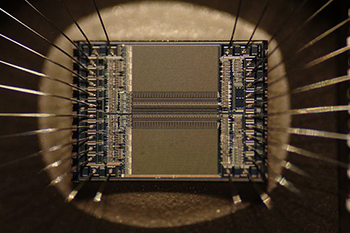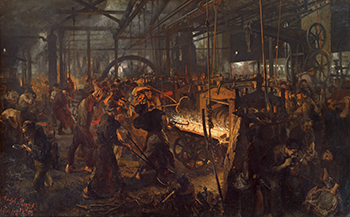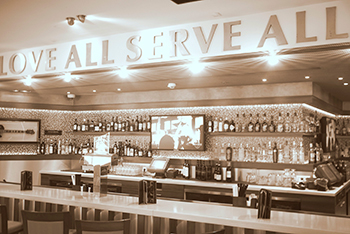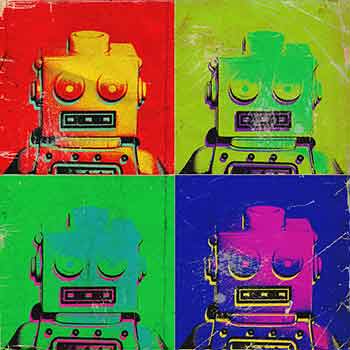"O’Reilly Solid Podcast" entries

Marcelo Coelho and Colin Raney on 3D printing and the digital manufacturing revolution
The O’Reilly Solid Podcast: Lessons from the Pop-up Factory.
Subscribe to the O’Reilly Solid Podcast for insight and analysis about the Internet of Things and the worlds of hardware, software, and manufacturing.
In this episode of the Solid Podcast, David Cranor and I talk with Marcelo Coelho, creative director of Marcelo Coelho Studio, and Colin Raney, chief marketing officer at Formlabs.
Coelho and Raney worked with Cranor on the Pop-up Factory, a production line that manufactured connected devices on the floor of the Solid 2015 conference. The four of us reviewed the process of spinning up the factory (which took just two months from beginning to end), and the impact of live fabrication on attendees at the conference.
Discussion points:
- Manufacturing as a creative process, and as an input for designers
- How 3D printing reduces iteration time and enables design and production to occur simultaneously
- Manufacturing as deployment
- Why the Pop-up Factory is analogous to the Hollywood model of film production

Robert Bodor on digital fabrication
The O’Reilly Solid Podcast: Software intelligence in the manufacturing process.
Subscribe to the O’Reilly Solid Podcast for insight and analysis about the Internet of Things and the worlds of hardware, software, and manufacturing.
In this episode of the Solid Podcast, David Cranor and I talk with Robert Bodor, vice president and general manager for the Americas at Proto Labs, a rapid-prototyping service that’s been able to digitize large parts of the fabrication process.
Discussion points:
- Proto Labs’ contribution to the Pop-Up Factory at the Solid 2015 conference
- How Proto Labs infused software into the injection molding process, enabling 24-hour turnaround on tooling
- 3D printing vs. injection molding (that old battle)
- Parts of the process that defy automation
- The pros and cons of in-house prototyping

Yancey Strickler on Kickstarter and public benefit corporations
The O’Reilly Solid Podcast: Kickstarter’s CEO on different models for viewing a company’s success.
Subscribe to the O’Reilly Solid Podcast for insight and analysis about the Internet of Things and the worlds of hardware, software, and manufacturing.
Kickstarter is one of just a handful of large companies that have become public benefit corporations — committing themselves legally to social as well as financial goals.
In making the transformation, Kickstarter’s leaders have taken a pragmatic, active position in promoting social good — neither purely philanthropic nor purely profit driven.
In this episode of the Solid Podcast, David Cranor and I talk with Kickstarter’s co-founder and CEO, Yancey Strickler, about his decision to take the company through the public benefit process and his promise not to go through an IPO.
Strickler will be among the speakers at the Next:Economy summit, November 12-13, 2015, in San Francisco.
Discussion points:
- Kickstarter’s reasoning behind its decision not to go public. Why not just sell the company and devote the proceeds to charity?
- The difference between a B corp and a public benefit corporation
- The “public good” principles in Kickstarter’s Benefit Corporation charter
- Determining metrics that can quantify public benefit goals
- Strickler’s thoughts on how Kickstarter’s PBC designation might influence a corporate model “different than hyper-growth, hyper-capitalist models that aren’t good for anyone other than people investing money”

Tobias Kinnebrew on robots as paint brushes
The O’Reilly Solid Podcast: How using robots for artistic purposes changes the way we perceive art.
Subscribe to the O’Reilly Solid Podcast for insight and analysis about the Internet of Things and the worlds of hardware, software, and manufacturing.
The short film Box caused a sensation in 2013 by effortlessly blending industrial robots and projection mapping — physical and digital. Bot & Dolly, the studio behind Box, specialized in robotic cinematography until it was bought by Google in 2013, becoming part of Google Robotics.
Sometimes overlooked amid the spectacular effects it developed in-house was the significance of Bot & Dolly’s software platform: it was an abstraction layer that worked as a plug-in for Autodesk’s Maya design software, putting otherwise arcane industrial robots in the hands of any production designer who could wield a mouse.
In this episode of the Solid Podcast, David Cranor and I talk with Tobias Kinnebrew, strategist at Google Robotics and formerly the director of product strategy at Bot & Dolly and principal creative director for HoloLens at Microsoft. Read more…

Julia Ko on developing a different kind of smartphone
The O’Reilly Solid Podcast: Entrepreneurship, niche product development, and spotting business opportunities.
Subscribe to the O’Reilly Solid Podcast for insight and analysis about the Internet of Things and the worlds of hardware, software, and manufacturing.
Many of the hardware creators we speak with come into their work through the enthusiast route: they start with an engineering problem they want to solve or a piece of technology they think is interesting, then look for an application that would support a business.
Julia Ko, our guest on this week’s episode of the Solid Podcast, started her company SurePod a very different way. She saw the business opportunity first, studying wholesale mobile contracts and the sales networks that distribute medical devices, and she developed a plan for a simplified mobile phone for older people. Only then did she learn the technical aspects of hardware production.
In this episode, we talk about Ko’s development as an entrepreneur, the challenge of creating a product for which you aren’t the target audience, and the best mobile phone carrier (Ko says it’s AT&T).

Brady Forrest and Renee DiResta on advising hardware startups
The O’Reilly Solid Podcast: Hardware startup success stories, pitfalls, and best practices.
Subscribe to the O’Reilly Solid Podcast for insight and analysis about the Internet of Things and the worlds of hardware, software, and manufacturing.
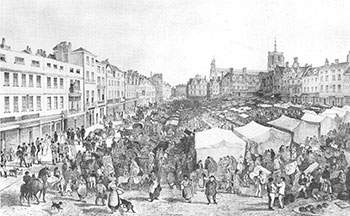 Hardware startups are starting to look like software startups: a lean company can bring a reasonably simple piece of consumer electronics to market for a few hundred thousand dollars.
Hardware startups are starting to look like software startups: a lean company can bring a reasonably simple piece of consumer electronics to market for a few hundred thousand dollars.
Behind that low figure are technological advances (like 3D printing and CNC machining that make prototyping faster and easier) as well as organizational advances — in particular, hardware incubators and accelerators that offer funding and help founders work their way through the product development process.
In our new episode of the Solid Podcast, David Cranor and I talk with Renee DiResta and Brady Forrest, co-authors (along with Ryan Vineyard) of The Hardware Startup: Building Your Product, Business and Brand. DiResta is vice president of business development at Haven, a marketplace for ocean freight shipping, and Forrest runs Highway1, a leading hardware incubator.
Forrest and DiResta take us into the trenches on a wide range of topics, including design for manufacture (DFM), idea validation, crowdfunding, cost control, marketing, packaging, and shipping. It’s a quick tour of the tricky areas of expertise that hardware founders need to develop. Read more…

Ben Einstein on accelerating hardware startups
The O’Reilly Solid Podcast: A discussion about critical issues for hardware startups.
Subscribe to the O’Reilly Solid Podcast for insight and analysis about the Internet of Things and the worlds of hardware, software, and manufacturing.
Hardware is getting more accessible, which makes hardware startups more appealing. A small team can develop a viable prototype for a simple product on a few hundred thousand dollars, and even tricky problems like autonomous cars are within the reach of startups.
Incubators and accelerators like Highway1, Lemnos, and HAX have played an important role in making hardware accessible; they help their portfolio companies work through the tricky engineering, manufacturing, and marketing problems that software startups don’t have to deal with.
In our new episode of the Solid Podcast, David Cranor and I have a wide-ranging discussion with Ben Einstein, co-founder and managing director of Bolt, one of the leading hardware startup accelerators.
Einstein, who spoke at Solid 2015 in California, talks about the importance of hardware marketing and customer development, including branding, crowdfunding, and virality (which is “much more possible with hardware now than it was 10 years ago,” he says). Read more…

Tying software and hardware together through art
The O'Reilly Solid Podcast: Andy Cavatorta and Jamie Zigelbaum on art that combines physical and digital.
One of the theses behind our Solid Conference is that the stacks — the ranges of knowledge that technologists need to understand — are expanding so that the formerly separate disciplines of hardware and software are merging. Specific expertise is still critical, but the future lies in systems that integrate physical and virtual, and developing those effectively requires the ability to understand both sides at some basic level.
Installation art is a great place to look for those seamless integrations, and we’re excited to feature a couple of interesting installations at Solid. Our latest episode of the Solid Podcast takes us to Flatbush Avenue in Brooklyn, home to a collective of designers and engineers called Dark Matter Manufacturing, where David Cranor and I spoke with Andy Cavatorta and Jamie Zigelbaum. Cavatorta and Zigelbaum both create installations; Cavatorta works with sound and robotics, and Zigelbaum’s projects explore communication and interaction.
Cavatorta’s Dervishes installation will appear at O’Reilly Solid, June 23-25. He will also speak on “Music, machines, and meaning: What art teaches us about robotics and networks.” Read more…

Cottage industry 2.0
The O'Reilly Solid Podcast: Amanda Peyton of Etsy on the rise of craft.
Our new episode of the Solid Podcast brings us to Etsy, where David and I spoke with Amanda Peyton, a serial entrepreneur and product manager at Etsy, about the company’s role as a macro-community of micro-communities.
The connection between Etsy and Solid might not be obvious at first. Etsy’s specialty is the ultra-analog: handmade crafts that represent a return to an earlier era of artisan design and manufacturing.
But Etsy is emblematic of how Web platforms have transformed the relationship between product creators and product consumers. It offers rapid feedback from the market, quick discovery of new trends, and access to a large and diverse enough customer base that even extraordinarily niche products can be viable.
The result is a community of distributed manufacturers that’s responsive and efficient. For goods that can be made without a large, well-capitalized factory (even some electronics now fall into this category), Etsy may be the future of manufacturing. Read more…

The challenge of connecting anything to the Internet
The O'Reilly Solid Podcast: Zach Supalla and Will Hart on building a supply chain, making radios work, and taking on big telecom.
Subscribe to the O’Reilly Solid podcast to stay on top of topics related to the Internet of Things, hardware, software, manufacturing, and the blurring of the physical and virtual worlds.
A few weeks ago, hours after launching a blow-out Kickstarter campaign, Zach Supalla and Will Hart of Spark Labs dropped by our podcasting studio to have a wide-ranging conversation about how they’d built a successful hardware startup, how they manage their overseas supply chain, and how they’re taking on established machine-to-machine and telecom companies by turning themselves into a mobile virtual network operator (MVNO).
Zach and Will are leading a workshop at our Solid Conference called “How to manage China” on how to build and maintain a supply chain.
Spark’s latest product, the Electron, is a tiny development kit that can connect just about any kind of device to Spark’s back-end platform over a 3G cellular signal for as little as $3 per month. Read more…
